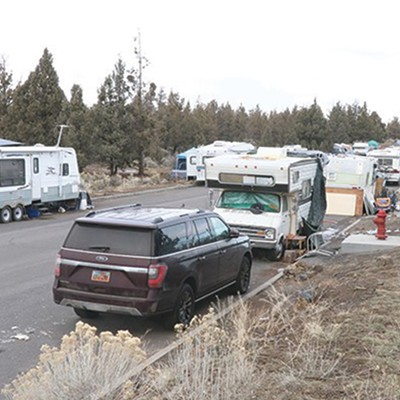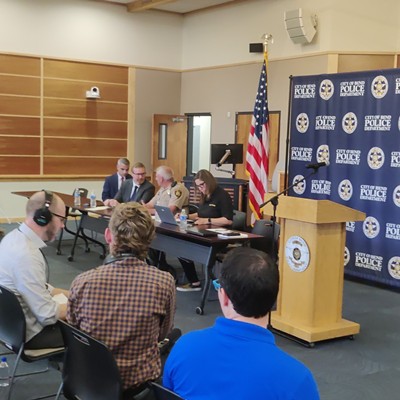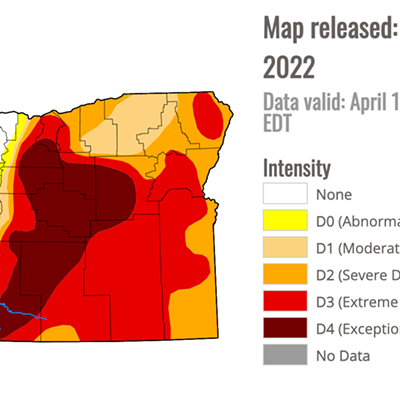Thirty years ago, Oregon schools rolled out the state's first school-based health centers aimed at improving health outcomes for kids. The first center was located at Portland's Roosevelt High School. According to Multnomah County's School-Based Health Centers website, school-based clinics are aimed at providing elementary, middle and high school students "access to comprehensive preventive, primary and mental healthcare," including age-appropriate reproductive health.
Today, there are two school-based health centers in Redmond and three within Bend-La Pine Schools. That includes one at Bend High School, another in La Pine and a third at Ensworth Elementary in Northeast Bend.
In the early days of the Multnomah County program, program managers advocated for the distribution of condoms—which caused immediate controversy. As time passed, however, full access to contraceptives became the "clear best practice in primary care," along with sexual health education that included abstinence-only education and support, according to Alexandra Lowell, who manages the 13 school-based clinics for the Multnomah County Health Department. The Portland clinics allow for full contraceptive dispensing. In late 2015, the David Douglas School Board approved condom dispensing at its school-based health clinic, however full contraceptive dispensing is not permitted. The Reynolds district offers no school clinic at all. School-based health centers in more traditionally-conservative districts, including La Grande High School, Union School, Baker High School and Grant Union High School also offer comprehensive birth control options.
As for the Portland area school-based health centers, Lowell says distribution of birth control does indeed influence outcomes. "There are many factors that help reduce teen pregnancy, and access to contraception is one of them." In 2010 when David Douglas did not allow condom distribution, the school district had a teen birth rate of 19.29 per 1,000 females ages 10-19, compared to 10.27 in Portland Public Schools, where distribution of birth control options is allowed. The highest pregnancy rate for the Portland area was in the Reynolds district—where there is no school-based clinic—at 21.32 per 1,000 females ages 10-19.
Central Oregon Statistics
In Central Oregon's public schools, access to contraceptives—or other forms of birth control—is a touchy subject. According to the Oregon Health Authority, teen pregnancies in Deschutes County have dropped every year since 2010. Still, teens are having sex.
According to a 2013 Oregon Healthy Teens Survey, nearly half—48.8 percent—of 11th graders in Deschutes County say they have had sex, most reporting that they started when they were 15 to 16 years old. Nine percent of 14-year old students and 10 percent of 13-year olds say they have had sex. Of the more than 100 teens in Deschutes County who become pregnant each year, more than 75 give birth.
Dr. Robert Ross, Medical Director of Community Health Strategy at St. Charles Health System, favors the dispensation of birth control at school health clinics. "I think it's important for parents to realize that if this is going to happen, that of the alternatives, it would probably be better to have birth control available than to end up with teenage pregnancy. That's my own belief, and parents have to make their own decisions about their kids."
One argument in favor of providing birth control at school health clinics is that teens often don't have transportation to readily seek the protection they need. Health officials argue that if protection were conveniently offered on site, the rate of unwanted pregnancies might drop even more.
Local Districts' Contraception Policies
Schools require health education from grade school through high school, which discusses health choices including sex and pregnancy. When it comes to dispensing condoms or other birth control, however, local districts have a range of policies. Statewide, there are a total of 77 school-based health centers, with 57 percent prescribing contraception and 38 percent dispensing contraception on site, according to the Oregon Health Authority.
In the Bend-La Pine district, "There's no school board policy which specifically addresses distribution of birth control," says Bend-La Pine's School Board Chair Peggy Kincade, a 10-year board member. She says it's important to provide education about one's sexual choices, but that she would need more information about the need for dispensing birth control at schools before making a judgment. "My gut reaction is we provide education and help kids to know what their options are. Whether we should be distributing it, I don't know." She continued, "My gut reaction is that's not the business we're in. We're in the business of education."
The Sisters School District allows the distribution of birth control at its school-based health center; Redmond and Bend-La Pine school districts do not. What Redmond and Bend-La Pine do offer: Childcare centers for teen parents.
For more than 20 years Bend-La Pine Schools has provided that daycare for teen parents at Bend High, similar to Redmond's program at Ridgeview High. The annual budget for the Bend-La Pine daycare program, according to Bend-La Pine Schools, is $150,000.
Ross says he is saddened to see high schools forced to provide costly day care centers when readily available birth control may help prevent the need. "It's a little disturbing. I have three daughters. To think that their lives could have been disturbed by having a kid when you're a teenager rather than choosing another path, including contraceptives, is just sad to me."
Local Contracts Prohibit Contraceptives
When the Source Weekly sought more information from local district officials, the superintendents in the Bend-La Pine and Sisters School Districts said they were not available for interviews. Bend-La Pine School's Julianne Repman asked that we submit questions by email. Redmond School officials, meanwhile, accepted our interview request.
Martha Hinman, Redmond's executive director of student services, says her district's contracts with St. Charles and Mosaic Medical were specific that there would be no contraceptive or contraceptive education provided at the school-based health clinics for anyone under 21. If students asked for contraceptives, she says students would be referred to Planned Parenthood or another community partner.
Hinman says Redmond Schools do not have a high rate of teen pregnancy. The school-based childcare center at Ridgeview High School has only four students using the service, down from about 20 students in the last eight to 10 years.
Considering the low teen pregnancy rate in Redmond schools, Hinman says sex education is working. Starting in kindergarten, the school system begins teaching students about making healthy choices. "We have 'safe touch' starting in kindergarten. It's embedded in our curriculum from middle through high school." Hinman says the Redmond program isn't focused only on sexual choices and relationships. "If they choose sex, the program instructs kids on how to be safe," she says.
The Bend-La Pine school district policy mirrors Redmond's policy. Communication Director Julianne Repman states, "Our three-way contract between Bend-La Pine Schools, Mosaic Medical and Deschutes County states that Mosaic Medical may not provide birth control to youth at the Bend-area clinics." Mosaic Medical is the health care partner for clinics at Bend High School and Ensworth Elementary, while the Community Clinic provides services in La Pine.
The State's Take: Contraception is a Best Practice
Still, those local school offerings don't reflect recommendations from state officials. According to the Oregon Health Authority, the State Program Office for school-based clinics recommends distribution of birth control on site. "SPO recommends onsite access to contraceptives and condoms. Providing access to contraceptives is a clinical best practice recognized by the American Academy of Pediatrics, the Centers for Disease Control and Prevention, and other national and international organizations. However, communities may choose to offer contraceptive services by referral." That's what Bend and Redmond schools choose—referral.
St. Charles' Dr. Ross says one of the biggest factors in women's advancements, including career choice, is the ability to achieve a high level of education. "Teenage pregnancy definitely affects that. Kids who have kids don't have the same opportunities. It's a much bigger struggle for them."
As to the distribution of contraceptives on campus, Ross says he encourages parents to look at the statistics. "Having kids have access to services including birth control does not say to them that you should go out and have sex."
Alexandra Lowell, at the Multnomah County Department of Health, agrees. "The mission of school-based health centers is to keep students healthy and ready to learn," she says. Lowell says on-site primary health care helps reduce absenteeism while making health care access more convenient for students and parents alike. "The school system focus on educating youth, and our focus on keeping them healthy is a partnership to provide kids with the best support possible to achieve a pathway to success."
The Portland-area program counsels students about contraceptive options, including abstinence, and supports them with their decisions. Lowell says, "Whenever possible, which is most of the time, we promote parental involvement and very often help clients communicate with their parents about these issues."
Bend-La Pine's Repman says, "Best practices suggest that teens need access to youth-friendly contraceptive and reproductive health services and support from parents and other trusted adults who can play an important role in helping teens make health choices about relationships, sex, and birth control, but we do not believe that our public schools should be dispensing birth control to our students."
Multnomah County's Lowell says kids will always develop into sexual beings, and not providing them with readily available contraceptives is a disservice. "Regardless of personal values of when sex should occur, denying youth access to preventive measures is a failure on our part to keep them focused on learning. Denying sexually active youth access to contraception does not stop the sex from happening; it simply puts them at higher risk of getting pregnant."

























